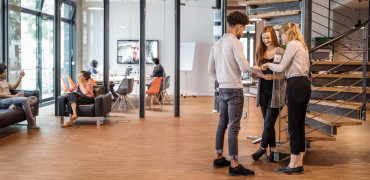In case you weren’t aware, last week was Mental Health awareness Week and, as a newly trained Mental Health first Aider, I thought I’d highlight the week and demonstrate why this matters to everyone, and how you can benefit yourself.
The theme of this year’s week was anxiety which is a normal emotion in all of us. However, for some, it can get out of control and become more of a problem.
Anxiety is one of the most common mental health problems and around 6 in 10 adults will experience levels of anxiety that stops them from doing the things they want to do, at some point in their life.
And this is where you can make a difference as a simple act of kindness from you, may make all the difference to someone who is feeling anxious, or even unappreciated.
And the upside is that helping others can be good for your own mental health.
In short, doing good, does you good.
"No act of kindness, no matter how small, is ever wasted”
Aesop
Look out for opportunities to be kind
Research shows that helping others can be good for our mental health. By looking out for each other in work and around our communities, we can help protect and maintain good mental health for all – including ourselves.
Helping others can reduce stress, improve our emotional wellbeing and even benefit our physical health.
So, keep an eye out for an opportunity to help someone with a random act of kindness. It can be as simple as donating to charity, talking to a shop assistant when paying at the till, or letting someone join the queue when you’re in traffic.
Have a conversation with neighbours that you normally just say hello to, offer to walk a friend’s dog, or even just pick up litter in the street.
Doing someone nice for someone doesn’t cost a lot of time and money.
“Kindness is the language which the deaf can hear and the blind can see”
Mark Twain
Kindness at work
A lot of us are still coming to terms with the new ways of working after the pandemic, and work can be busy, stressful, and full of anxiety.
Work can also be an isolating place sometimes, especially if you constantly have your head down, trying to cope with a busy workload. Whether you are in an office or on the road, it can be easy to forget that you are part of a wider team.
That’s where a random act of kindness can make all the difference to someone’s day.
If you see someone who looks super busy, offering to make a cup of tea or coffee can make all the difference, even if they don’t want one. Just stopping to ask lets them know that they’re not alone.
And why not eat lunch with colleagues rather than sitting at your desk. Again, it will be good for you and, in your busy colleague’s case, it can help break the working day and improve their own mental health.
And again, it has a positive effect on you as well because kindness to colleagues helps to strengthen your team. Being kind to colleagues you don’t know so well not only helps them feel connected to the wider team, but it also helps nurture relationships across the company.
People who feel better connected have reported lower rates of anxiety and depression. Studies have also shown that social connections can lead to higher self-esteem, being more empathetic, trusting and co-operative.
“Do your little bit of good where you are; it’s those little bits of good put together that overwhelm the world.”
Desmond Tutu
Time to vent
Sometimes, the kindest thing you can do with family, friends and colleagues is just listen.
All of us have bad days from time to time and listening to someone tell you why theirs was so bad will help them offload all the emotion involved and help them get to a better place mentally.
Whilst it’s unlikely that you’ll be able to solve their issues there and then, you might be able to offer another perspective and even if you can’t, just lending them your ear to vent into really will make a difference.
“Sometimes it takes only one act of kindness and caring to change a person’s life”
Jackie Chan
What are the benefits?
- Helping others feels good
When you help others, it promotes positive physiological changes in the brain associated with happiness. Helping others improves social support, encourages us to lead a more physically active lifestyle, distracts us from our own problems, allows us to engage in a meaningful activity and improves our self-esteem.
- It brings a sense of belonging and reduces isolation
Being a part of a social network leads to a feeling of belonging. Face-to-face activities such as volunteering at a drop-in centre can help reduce loneliness and isolation.
- It helps to keep things in perspective
Helping others in need, especially those who are less fortunate than yourself, can provide a real sense of perspective and make you realise how lucky you are, helping you to achieve a more positive outlook on things that may be causing you stress.
- It helps make the world a happier place – it’s contagious!
Acts of kindness have the potential to make the world a happier place. It can also encourage others to repeat the good deed that they’ve experienced themselves – it contributes to a more positive community.
- The more you do for others, the more you do for yourself
Evidence shows that the benefits of helping others can last long after the act itself by providing a ‘kindness bank’ of memories that can be drawn upon in the future.
- Physical health benefits
These include reducing stress and helping to boost our immune system, and in turn can protect us against disease.
It helps get rid of negative feelings such as anger, aggression or hostility, which have a negative impact on our mind and body. Engaging in random acts of kindness can help decrease these feelings and stabilise our overall health.
- It can help us live longer
Giving and helping others may increase how long we live. Studies of older people show that those who give support to others live longer than those who don’t.
“Kindness is something anyone can give without losing anything themselves.”
The power of connection
Making small simple changes in life can create big changes and connections to those around us, as Giovanna Lever explains in this TED talk.
Giovanna is an expert in strategic planning and human centred design, change management, stakeholder engagement and facilitation.
In the TED talk, she speaks of the power of human connection, by nurturing our communities and those close to us.
So, if the only act of kindness you can manage today is to listen to her TED talk, then at least you will have helped your own mental wellbeing, which is a great place to start.
Martin Fahey is Head of Sustainability and a Mental Health First Aider


